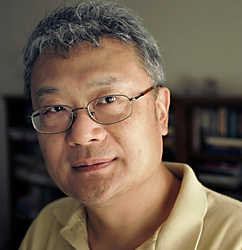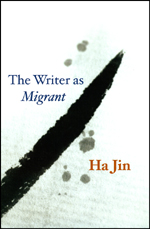Ha Jin: The Writer as Migrant
By Bill Marx

Novelist Ha Jin — “Only through history can history be conquered.”
On my latest World Books podcast I talk to writer Ha Jin, who in 1985 left China to attend Brandeis University. Since then he has written five novels, including “Waiting” which won the National Book Award and “War Trash,” the recipient of the PEN Faulkner award. Jin currently teaches literature at Boston University. His latest book is not a work of fiction, but a slim collection of essays on the nature of geographical location and creativity published by University of Chicago Press.
Entitled “The Writer as Migrant,” the book looks at the different ways writers have dealt with geographic displacement, from Joseph Conrad and Alexander Solzhenitsyn to V. S. Naipaul. In our conversation, Jin talks about the personal discoveries he made while writing the book, as well as his belief that history is best understood through fiction. He uses “War Trash,” his novel about Chinese involvement in the Korean War, as an example of the imagination’s reanimation of the past. Ironically, “The Writer as Migrant” follows on the heels of “A Free Life,” the first novel Jin has set entirely in America.
For those of you who don’t know about us, and wish to subscribe to this and other great podcast and blogs, The World is an international news program co-produced by the BBC World Service in London, Public Radio International and WGBH Boston. And World Books is more than my podcast — the online feature includes reviews, interviews, news, and commentary on international literature, including a review of “2666,” Chilean writer Roberto Bolaño epic novel which many critics consider to be a masterpiece of Latin American fiction.
For more information about World Books, as well as a chance to comment on reviews and to suggest authors to be interviewed, sign up at the World Books Facebook fan page.
Tagged: Books, Featured, Ha-Jin, Podcast, Roberto-Bolaño, The-Writer-as-Migrant

